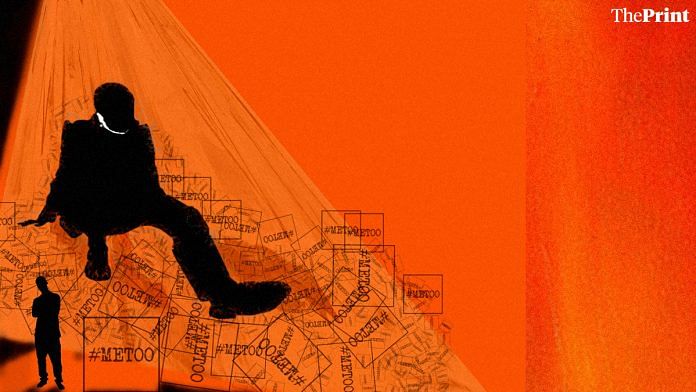With #MeToo hitting India, several popular names from entertainment and media industry have been accused of sexual harassment by women.
ThePrint asks: How did you react when people you looked up to were named in India’s #MeToo?
#MeToo has shown the mirror to men like Kiran Nagarkar
 Simrin Sirur
Simrin Sirur
Journalist
When I found out that Kiran Nagarkar had been accused of sexual harassment, I felt a mix of disgust and disappointment. His book, Seven Sixes are Forty Three, moved me deeply because of how nuanced its understanding of exploitation was, particularly of India’s poor and downtrodden.
The book opens with a scene of a man violently beating his wife until she decides to self-immolate. Nagarkar writes viscerally, with the intent to leave you shaken, which it does. More importantly he writes to show you the everyday plight of the lower to middle-class Indian woman.
To think that this very same man, writing about the struggles of India’s marginalised, was allegedly molesting women and manipulating them into keeping quiet is despicable. It makes me shudder to think of where his ‘writing material’ came from. It goes without saying that I will no longer be recommending this book to my friends, no matter how nuanced or well written.
The anger and disappointment aside, I cannot say I was surprised. News of men harassing women stopped surprising me a long time ago, and I’m starting to believe those who do feel surprise are myopic.
Most, if not all men, are disrespectful of women’s bodies. We are objectified, sexualised and brutalised everyday. Every single woman I know has been subject to this totally violent gaze by men across classes. ‘Educated’ and ‘well-read’ men from the upper classes and castes, to which we belong, are very comfortable perpetuating the violence they publically condemn. This perhaps is the most important point driving #MeToo.
It’s easy for Nagarkar to set himself aside and write about violence that plagues India’s poor, but #MeToo has put the mirror up to men like him, too.
Denial can only help you for so long before it drowns you out
 Fatima Khan
Fatima Khan
Journalist
“Don’t idolise anyone, ever” — we’ve been told this innumerable times growing up. The fact that we still fail to listen is just another example of human fallibility. The past week has been an essential reminder of fallibility. The idea that those we look up to, fail, is not surprising; that they fail so miserably is.
Woke journalists who have won awards for their socially aware content, comedians whose work I’ve personally known to inspire friends into becoming feminists, social media influencers whose profiles became my go-to spots to understand a societal plague better – I never wanted to look up to these people, it just ended up happening. Of course, it was heartbreaking. For many, I even tried to rationalise their actions – “maybe it’s not as bad as it seems”.
But denial can only help you for so long before it drowns you out. Some of my favorite public personalities being accused of harassment made me question a lot of what I thought I knew. But it also reaffirmed a lot that I believe in.
Consent, for instance, is a perpetually ongoing conversation. It lies in the grey plenty of times, but in clear blacks and whites several other times too. It also made me realise that harassers aren’t “certain people” who look/act/behave a “certain way”— they can be from among us.
It was also an important lesson in how silence is akin to complicity. If you know a harasser from among your circle, you call them out. The details of these incidents made many of us introspect on how we might have failed at multiple counts.
To all men who feel wrongly accused, right now we feel betrayed
 Deeksha Bhardwaj
Deeksha Bhardwaj
Journalist
It is human nature to put people on a pedestal, especially, seemingly ‘woke’, aware and informed people. Of the names outed in #MeToo, at least a few have taken most by surprise, if not shock.
Varun Grover, accused of dry humping a woman, writes, “It s hard to reconcile the two – ‘believe women’ and ‘don’t put any allegations on me’.”
#MeToo as a movement operates on the premise that the onus is no longer on women. It’s not they who must prove the allegations, but men who must disprove them.
As the firestorm rages on social media, men have taken recourse to three broad approaches.
There is a section that is sworn to secrecy and wedded to silence. These men, many assume, are guilty as charged.
Another section has taken the apology route. This is symptomatic of the classic ‘men will be men’ approach. At best, these men show a crude disregard for women’s private spaces. At worst, they hold up a mirror to the rampant misogyny and sexism.
Finally, there’s the category of men who vehemently deny the charges. This is the trickiest category. The names you admire, for their work and their proclaimed beliefs, are likely to feature here.
Most have denied the allegations categorically, some have even stepped away from their organisations. However, that doesn’t solve the dilemma – how many of these ‘woke’ men actually are hypocritical? Women across spectrums trusted these men.
We trusted them, because we felt they understood. Right now, we feel betrayed.
Believe women, they are risking much by sharing their experience. For the men who feel they have been wrongly accused – too many women have suffered for us to prioritise you at this crucial juncture. Prove your innocence, and we’ll believe you too.
People can’t hide behind a veil now
 Nikhil Rampal
Nikhil Rampal
Journalist
#MeToo India shows that activism doesn’t come with a guarantee that the activist can’t do anything wrong.
For a long time, I had the perception that people who are involved in activism will be the ones who won’t do the things they’re fighting against.
Until #MeToo India happened.
Of course, reel and real lives are different and people don’t turn out to be what they appear as in their movies.
For instance, Nana Patekar’s image in my head was of someone who was fighting for the right thing. In real life, he also did a lot for the farmers. In 2016, Alok Nath was all over social media being tagged as ‘Babuji’. His patriarch characters from movies also helped in creating a positive perception about him.
Aditi Mittal, one of India’s biggest feminist comediennes, won my heart when she spoke about Utsav Chakraborty’s case as part of the movement.
After the names of all these people came up, my belief, that people who display strong ideals cannot be obnoxious, was shaken.
I now know I was wrong. The perception I had in my mind was wrong. People have double standards and that came out clearly. Thanks to #MeToo, now people can’t hide behind the veil of their activism.
Dents my dream of working with media industry’s famed ones
 Sharanya Munsi
Sharanya Munsi
Web Editor
India’s #MeToo movement in the media industry has been an eye-opener for the public and for those working in it. The unmasking of these powerful men only shows reverence in the field rarely equates with morality. The mention of these names brings them down from their pedestal.
While it may not necessarily cast a shadow on the professional work they have done so far, it sure casts a negative light on their character. As a young journalist, this dents my dreams of working with them and learning from them.
Eventually, no one wants to be around a person who makes them uncomfortable, regardless of how illustrious they are. M.J. Akbar, particularly, was someone I looked up to while interning at the Kolkata bureau of The Asian Age.
However, in light of the names surfacing, as a woman, the movement gives me an assurance that no matter how powerful or well known a person may be, I have a right to speak up. Cowering down is not an option.
Wrongs committed to female body are finally being defined
 Prerna Chatterjee
Prerna Chatterjee
Journalist
When allegations of sexual harassment flooded in about glorious journalists and other eminent personalities, my heroes started falling one after another. It was a moment of disillusionment.
Instead of sympathising with the victims, I immediately started looking for clarifications and justifications from my much adored ‘icons’. I came across a series of apologies from the perpetrators. What baffled me was the tone of these apology notes. Not only was there a lack of sincerity, but also an adamant tone of dismissal in these.
Alok Nath neither confirmed nor denied rape and shamelessly said that “it may have been done by someone else”. Chetan Bhagat blamed the “phase” he was going through and apologised to his wife thrice in the note. The girl he harassed was only mentioned as a fleeting reference. M.J. Akbar’s reply to eighteen-year-old Puy Kamp’s father read, “But these issues are so prone to misunderstanding that there is no point debating them.” On reading several such arrogant responses, I realised that our fallen heroes were never heroes in the first place.
#MeToo has created a culture where the wrongs done to the female body are finally being defined. Liberation of the body is a personal choice. So a seemingly friendly hug might make someone shudder in disgust.
The halfhearted responses mostly indicate that the gestures were harmless and not meant to cause discomfort. But #MeToo, apart from being a movement which voices women’s concerns, should evolve into a revolution that suppresses haughty justifications in the guise of apologies and explanations.
By Neera Majumdar, journalist at ThePrint.




In a slightly different context, I used to respect Ms Tavleen Singh, but after reading her latest column in IE, that has changed.